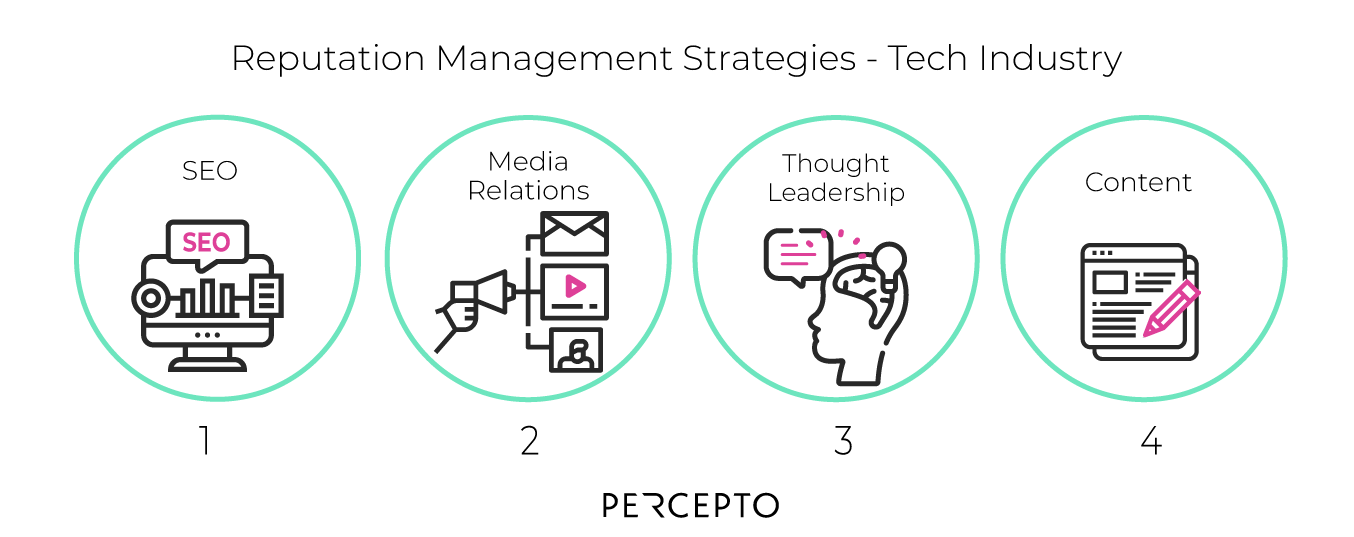Reputation Management for Tech Companies: A Comparative Study Across Industries

Once built on more tangible components, reputation management has shifted to the digital realm, today focusing on creating, maintaining, or repairing an organization’s perception across online spaces, through multiple strategies.
The digital nature of reputation management in tech is particularly critical as technology companies primarily operate online, with products often having a direct impact on how people use services. Reputations are placed under constant scrutiny from a global audience, making effective management vital for both success and survival.
This article examines reputation management across software, hardware, telecommunications, and e-commerce sectors, offering insights for each sector to strengthen its strategy.
Core Reputation Management Strategies for the Tech Industry
Let’s begin our analysis by looking at universal reputation management strategies and how they apply to the tech industry.

SEO has become a critical tool in the tech industry, where digital presence is almost synonymous with corporate identity. It ensures that when potential clients or stakeholders search for a tech company online, they are met with positive, appropriate, and authoritative content. However, reputation management using SEO should be considered only in the framework of SERM (Search Engine Reputation Management), since this is the precise direction that you want to handle your business reputation from organic sources. In other words, using SEO for reputation management refers to using content marketing and backlink analysis in promoting a good reputation. In addition, tracking and monitoring negative keywords that refer to your brand in search engine results can also be considered as use of SEO to protect, maintain, or grow your online reputation.
Maintaining robust media relations in the fast-paced tech industry is vital to proactive reputation management. Tech companies must cultivate transparent relationships with the media to ensure accurate and favorable coverage. Media relations are also viewed as tools to wash off bad reputation from brands. Companies like Disney, or McDonald's for example used media relations to keep their audience calm about customer issues at specific points in their history. The most reliable and organic way to use media relations in reputation management, is to earn media, or their attention by the quality of the news your business can produce. Paid media on the other hand, can inntialy help you reach a specific level of visibility in a short time, using tools such as press releases for example.
Thought leadership is another key strategy. By positioning company leaders as field experts, tech companies can influence industry trends and discussions, enhancing their reputation. This approach boosts the company's image and inspires confidence in its products and services, fostering long-term loyalty.Thought leadership nowadays is really close to what we know as influencer marketing, but it's not the same. While Thought leadership is rather a business, corporate approach to influence the masses and their opinions through data, innovation, experience and expertise, Influencer marketing refers to a broader segment of tools and tactics present on social media and meant to convince audiences about specific products and services in a more entertaining way.
Creating compelling content, such as blog posts, whitepapers, case studies, and videos highlighting the company, is vital. Such content supports SEO efforts, encouraging shares and enhancing the brand’s online visibility. Yet, content marketing should be looked at as a long-term strategy, and rather a supporting tool due to the volatile probability to impact the consumers, and their opinions.
Comparative Analysis of Reputation Management Strategies Across Different Industries
Having outlined general strategies that span across industries, let’s now dive into how specific sectors within the tech industry tailor these approaches to meet their unique needs.
Having outlined general strategies that span across industries, let’s now dive into how specific sectors within the tech industry tailor these approaches to meet their unique needs.

Software Industry
Under the tech umbrella, the software industry can be understood as application software, system infrastructure software, SaaS, operating systems, database, and analytics software.
The sector presents specific issues in regards to reputation management due to its rapid innovation and the critical nature of data security. Frequent updates and releases can introduce vulnerabilities or lead to public concerns about privacy and security. Effective reputation management will strongly involve transparent communication about security and data usage with users.
A key strategy is to manage user expectations and concerns proactively. This can be demonstrated through robust update logs, clear privacy policies, and direct responses to user queries. Engaging with the community through forums and feedback channels is also vital, ensuring users feel heard, which can help mitigate negative perceptions.
Microsoft’s response to privacy concerns with its Windows 10 update is an example of handling such challenges. The company faced criticism over its data collection practices and introduced a new privacy dashboard, allowing users to see and control their data more effectively. Microsoft also changed its privacy settings, simplifying choices, increasing transparency, and restoring trust.
Microsoft implemented new tools like the privacy dashboard and paired these changes with strategic press releases and active media engagement. Microsoft effectively restored trust and reinforced its commitment to user privacy by controlling the narrative through updates and proactive media relations.
Nonetheless, not all software companies have the same capabilities as Microsoft, so for smaller tech companies the best tactic to handle reputation management is to prevent damaging it. Therefore, the service quality, communication, and transparency are the main key-players in establishing a good reputation. In addition, another way of managing company reputation in the software industry are business directories and tech platforms. For example, on TechBehemoths, companies can be compared from different perspectives, such as pricing, experience on the market, reviews, portfolio and more. In this way, clients can decide which aspect is more important for them in taking a decision to reach out or not.
We must note, that, client reviews in the software industry are more important now in reputation management, since it is a User Generated Content, based on real experience or expectations towards a company.
Hardware Industry
A core component of the tech industry, the hardware industry refers to semiconductors, computer hardware and technology, and other peripheral devices. Some of the reputation management challenges this industry subsector faces must include strategies to address supply chain transparency, environmental concerns, and product reliability.
Customers and regulators increasingly demand insights into product components' origins and ethical implications. Hardware companies can enhance their reputations by implementing and communicating stricter supplier standards, conducting regular audits, and ensuring practices comply with established guidelines.
Another challenge can come from the production side. Ensuring that products are durable and meet customer expectations is crucial. Effective quality control measures, prompt and transparent handling of recalls, and maintaining open lines of communication with customers about product issues are essential strategies.
A notable example of a well-managed reputation is how Samsung handled the Galaxy Note 7 battery explosion scandal. They faced significant brand damage when these smartphones began catching fire due to battery malfunctions. Samsung's approach included taking full responsibility, engaging in extensive problem-solving, and introducing an 8-point safety check.
Samsung also improved its communication strategy by holding press conferences to explain the issues and the steps to resolve them, which included investigations and third-party audits. This approach helped mitigate the immediate crisis and contributed to a long-term recovery in brand perception.
Aside from the examples with Samsung, hardware companies, especially smaller ones, can keep or improve their reputation through other means, such as word of mouth. Even though it may be challenging to convince clients to spread the word about a hardware business or product, word of mouth has higher chances to convince the audience about the quality, or other technical aspects. Moreover, in the hardware industry influencer marketing is also a known practice. Publishing videos with product hands-on on social media platforms can be more than convincing for broader audiences.
Telecommunications Industry
The telecommunications industry can primarily include fixed-line and mobile internet and telephony services, with social media often included in that definition.
Unique challenges in reputation management often revolve around data security and privacy, as the nature of the industry demands the handling of vast amounts of sensitive customer data. Effective management strategies must include robust security measures, transparent communication, and rapid response protocols in the event of data breaches.
A relevant example of handling reputation management well in this sector is T-Mobile’s response to its 2023 data breach. T-Mobile was quick to detect and address unauthorized access that compromised customer data. They promptly informed affected customers and took measures such as resetting account PINs and offering two years of free credit monitoring and identity theft detection services. These actions help mitigate the damage to their reputation by showing responsiveness and a proactive stance in protecting their customers.
In the telecom industry, technical aspects, as well as reviews play a more impactful role in reputation management. For example, internet speed - is a popular KPI for internet providers. This criteria is mainly used by all their audiences regardless on how much money the provider invests in marketing.
E-commerce Industry
Operating within the tech industry, the e-commerce industry, which facilitates digital transactions, encounters unique challenges in managing reputation, particularly in consumer trust, data security, and customer service excellence.
In the e-commerce industry, managing customer reviews presents a significant challenge to reputation management. Reviews heavily influence customer purchasing decisions, yet the prevalence of fake or unverified reviews can severely impact a business’s credibility. For instance, significant platforms like Amazon have struggled with a high volume of unverified reviews, which rose from 36% in 2019 to 42% in 2020. This trend highlights the difficulty in maintaining authenticity in customer feedback.
To combat this, e-commerce companies need to implement more robust verification processes to confirm the authenticity of reviews. Techniques such as verifying purchases or employing advanced algorithms to detect fraudulent patterns are essential. Furthermore, actively engaging with customer reviews, responding to feedback, and resolving issues transparently can enhance credibility and trust. This proactive approach addresses the concerns raised in reviews and demonstrates the company’s commitment to customer satisfaction and continuous improvement.
Challenges in Reputation Management for Tech Companies
The more connected society becomes, the more scrutiny organizations face, even those with solid reputation management. Tech companies, especially those at the forefront of innovation, will continue to grapple with managing their narratives on search engines and reviews and combating general tech distrust from users. These challenges underscore the critical importance of effective reputation management strategies.
One major challenge tech companies face when managing their reputations is related to their first impression. People form impressions of a company based on their first page of search engine results.
A staggering 90% of people worldwide will only look at the first page of search engine results when considering a service from a company.

Tech companies need to ensure their stakeholders can easily find them when searching for keywords, using SEO strategies to place their companies on the first page, as users are unlikely to look beyond that.
Another significant challenge facing tech companies is the erosion of trust. Recent studies and polls consistently show a marked decline in the public's trust in the technology sector. The overall perception is that tech companies, once seen as champions of innovation and progress, are now viewed with skepticism for their roles in privacy invasion and economic dominance.
This growing distrust is not just a superficial image issue—it translates directly into tangible challenges for tech companies in maintaining a positive reputation. To combat this, companies must prioritize transparent data practices, actively engage in ethical business operations, and ensure their growth does not overshadow their commitment to societal welfare.
Recommendations for Improving Reputation Management Trends and Insights 2024
As we explore the evolving landscape of reputation management across various industries in this article, it becomes clear that while each sector has unique challenges, some overarching strategies are gaining prominence as we head into 2024.
Video content is becoming essential for enhancing brand reputation in the e-commerce industry. With social media platforms growing as primary sources of information, integrating high-quality video content into marketing strategies can significantly boost brand awareness and engagement.
Given Google's substantial influence on online visibility, businesses should prioritize optimizing their content and advertisements for this platform to maximize reach and customer engagement.
Positioning company leaders as field experts can also significantly enhance brand reputation. Thought leadership articles, webinars, blogs, and speaking engagements can help shape industry trends and build trust with new and existing customers.
By addressing these challenges with focused strategies and aligning with emerging trends, e-commerce companies can strengthen their reputation management efforts, leading to sustained growth and success.
References
- 5WPR. "What is Technology PR?" 5W Public Relations, 31 Jan. 2024
- Dua, Tanya. "From a 'Cultural Meme' to a Comeback Kid: How Samsung Overcame Its Galaxy Note 7 Fiasco." Business Insider, 6 Oct. 2017
- Hardware." Statista, no date, www.statista.com/markets/418/topic/482/hardware/#overview. Accessed 29 Apr. 2024
- Kates, Sean, Jonathan Ladd, and Joshua A. Tucker. "How Americans’ Confidence in Technology Firms Has Dropped: Evidence from the Second Wave of the American Institutional Confidence Poll." Brookings, 14 June 2023
- Labus, Helga. "T-Mobile Suffers Second Data Breach This Year." Help Net Security, 3 May 2023
- Lindner, Jannik. "Reputation Management Statistics." Gitnux Marketdata Report 2024, 24 Apr. 2024, . Accessed 29 Apr. 2024.
- Pressfarm. "Satya Nadella's Leadership Style: Philosophy of Microsoft's CEO." Press Farm, 21 Mar. 2024
- Pollit, Helen. "SEO & Reputation Management: An In-Depth Guide." Search Engine Journal, 10 Apr. 2023
- Şirzad, N. "A Review on Online Reputation Management and Online Reputation Components." Doğuş Üniversitesi Dergisi, vol. 23, no. 1, 2022, pp. 219-242. https://doi.org/10.31671/doujournal.957602.